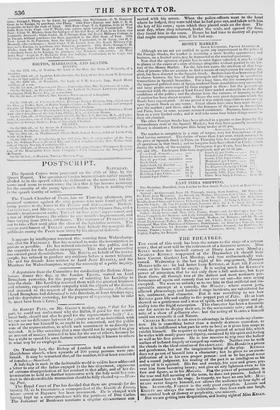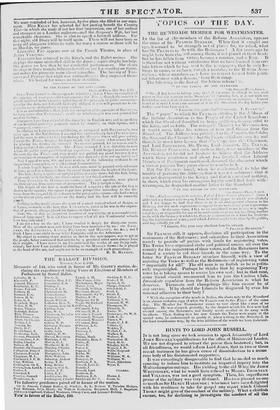THE THEATRES.
THE event of this Iveek has been the return to the stage of a veteran actor ; that of next will be the retirement of a favourite actress. N iss KELLY makes her farewell curtsey at Drury Lane next Monday; CHARLES KEMBLE reappeared at the Haymarket (it should have been Covent Garden) last Monday, and was enthusiastically wel- comed. Wednesday is the last night of his engagement, Manager Mamas tells us : he had better keep KEMBLE, at least till FannEN come, or his house will be empty. It is saying much for Klialat.E's power of attraction, that he not only drew a full audience, but kept them there, all through two of the dullest and most mediocre per- formances .of opera and comedy that we ever sat out—his own acting - excepted. We were so unlucky as to see him in that artificial and dis- agreeable attempt at a comedy, the Wonder ; where coarse jests, affected phraseology, and haeknied stage incidents, are substituted for wit, sentiment, and character. But it was something to see how KEMIILE gave life and reality to the puppet part of Felix. Ile at least showed us a gentleman and a man of spirit, and infused vigour and ge- niality into the frigid conception. This character has been a favourite one for actors to display their art, in the serio-comic vein ; and it ad-. limits of a show of gallantry also : but the acting of GARRICK himself could not reconcile it and Nature.
CHARLES KI.MBLE is not seen to advantage in these made-up charac- ters. Ile is something better than a merely dextrous comedian, to whom it is indifferent what part he acts so long as it gives him scope to exhibit himself. He requires to tread the ground of actual life, which he walks with manly grace and dignity, sustained by his spirit and feeling as well as his fine person. He is too massive to trip over the hollow surface of inflated tragedy or vamped-up comedy. Neither can he walk the clouds in the ideal creation of SHAKESPEARE. His Hamlet is a prince and gentleman, but not the imaginative being of the play. KEMet'E does not go out of himself into a character ; but be gives its an exem- plification of it in his own proper person : and as he has good sense and a sound judgment, his reading of the part is as intelligent as his acting of it is spirited. His fire and energy, his ease and grace, pre- vent him from becoming heavy ; and give an airy lightness even to his face and figure, as in his Mereutio. But, the power of personation, fn the true and full meaning of the term, he does not possess. Indeed it seems almost lost to the stage. In tragedy, we have no one left
READY never forgets himself, nor allows the audience to lose sight of him. In comedy, FARREN is the only great exception. Lisros and KEELEY are always the same individuals they have each one laugh, one comical look of dismay or perplexity, one manner. But we are getting into disquisition, and losing sight of Miss KELLY.
We were reminded of her, however, by the place she filled in our argu. meat. Miss KELLY has selected for her parting benefit the Country Girl—in which she made if not her first impression, one of her earliest and strongest on a London audience—and the Sergeant's Wife, her last remarkable character. She is also to speak a farewell address. Fur that night, old Drury will be itself again. There will not have been so many old playgoers within its walls for many a season as there will be on Mondsy, we guess.
LEONTINE FAY appears now at the French Theatre, in place of k:NNY VERTPRE.
Tsosiosi has returned to the King's, end the Pallet revives. She displays the same unrivalled skill it the dance ; captiv iting by her lady- like graces no less than by her wonderful performances. She clears the stage at three bounds, balances herself on in Itv staaing on tiptoe, and makes the pirouette Seem almost a:Jecable. The lancing of TAO- LIONI aml l'Ealurr hist night was extraordinl; y : they surpassed them- selves. We looked for wings on their slemiders.



























 Previous page
Previous page